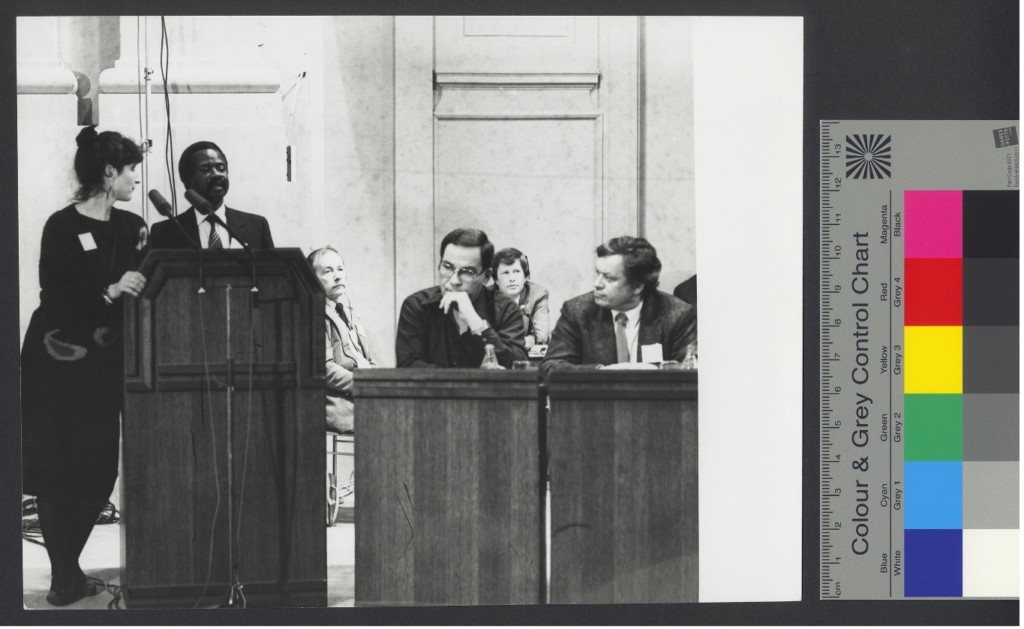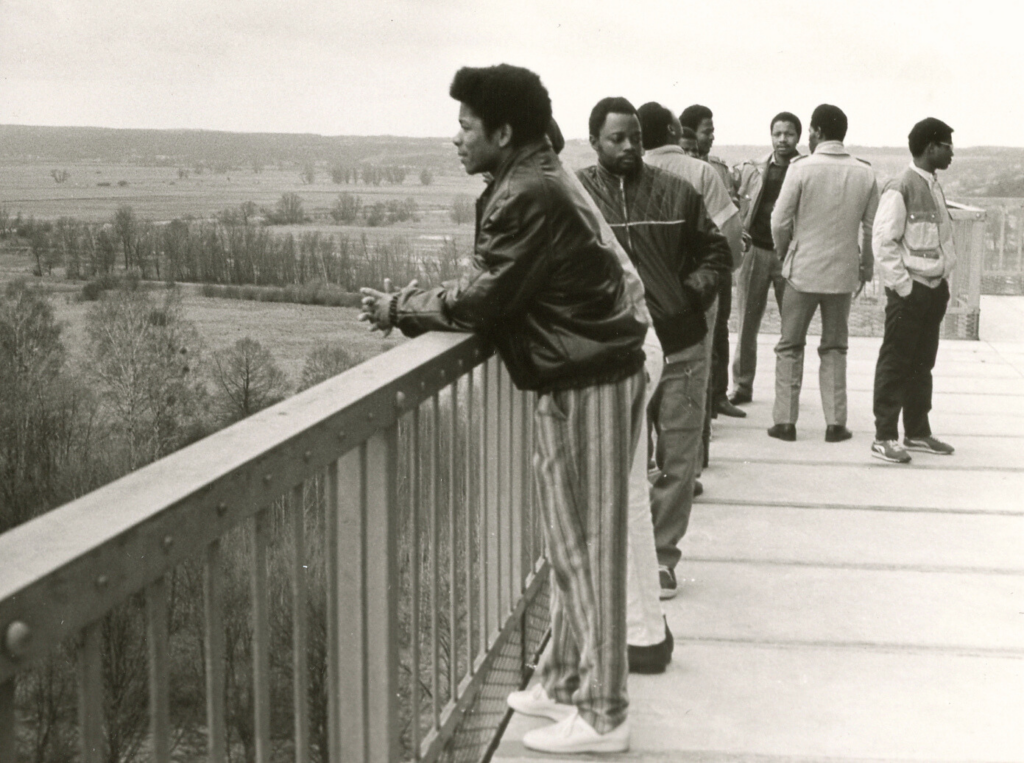
Study

Mankew V. Mahumana in 1987 at the Academy of Arts (East), Photo by P. Marzat (Foto AdK-O / 165-4)
06 Troubled Comradeship in the Arts
Between Mozambique and East Germany
Researcher
Our research recounts the history of artists exchange programs, travelling exhibitions, and other forms of cultural transfers between Mozambique and East Germany in the 1980s. Wary of grand narratives, we seek to reflect on microhistories, composing fragments in the inexhausted project of socialist internationalism. Supported by Mozambican art historian Alda Costa, we map out some of the actors and institutions involved in this exchange and situate their practice and the values they reflect in the historical context of their time.
The protagonists of our research are two Mozambican artists: the painter Mankew Valente Mahumana and the theatre director David Abílio Mondlane. Both crossed, challenged, and reinvented the fragmented space of cultural exchange between East Germany and Mozambique. In the process of decolonization, civil war, and construction of a new country, Mozambican artists sought an active role, fostering people’s hope and confidence in the revolutionary transition. Meanwhile, in East Germany, cultural policies hardened and artists faced increasing restrictions.
In this challenging context, exchanges in art and education between both countries created a space of possibility and encounter. However, these exchanges were closely monitored to align with economic and political agendas veiled under discourses of brotherhood and anti-imperial solidarity. Thus, we ask how Mozambique’s search for a postcolonial culture shaped its cooperation with East Germany.
Terms
- Alda Costa
- Archival Material
- David A. Mondlane
- East-Berlin
- Exchange
- Film
- Friendship
- Ginga Eichler
- Mankew V. Mahumana
- Maputo
- Micro-history
- Moatize
- Painting
- Peter Stobinski
- Photography
- Poster Art
- Schwerin
- Solidarity
Study Materials
- A
- Accra (1)
- agarwal, vinit (7)
- Alda Costa (1)
- Algorithmic cruelty (1)
- Amaro, Ramon (1)
- Anti-fascism (3)
- Archival Material (2)
- Archival metabolism (5)
- Automation (1)
- B
- Berlin (2)
- Bitterfeld-Wolfen Plant (1)
- Black Feminism (4)
- Bombay (1)
- Borges, Sónia Vaz (3)
- Bricks (1)
- Brüggmann, Eva (2)
- C
- Cambodia (1)
- Cap Verde (1)
- Charara, Ghalas (1)
- Chile (2)
- Cinema (3)
- Coding (2)
- Cold War (2)
- Coming together (3)
- Communist Feminism (3)
- Cosmogony (2)
- Cuba (1)
- Cupers, Kenny (1)
- curatorial/politics (3)
- Cybernetic Eye (1)
- Cybernetics (1)
- D
- David A. Mondlane (2)
- Decolonizing Mathematics (1)
- DEFA (2)
- Dhanau (1)
- Diagram (2)
- Diary (2)
- Digital image (2)
- Digitized Image (3)
- Drawing (1)
- Dresden (1)
- Dresden State Art Collection (1)
- Dubai (1)
- E
- East-Berlin (4)
- Eberswalde (1)
- Educational Internationalism (4)
- Eshun, Kodwo (1)
- Evolutionary Cybernetics (1)
- Exchange (1)
- F
- Failure of denacification (2)
- Film (3)
- Film Institute Babelsberg (2)
- film poster (2)
- Friendship (1)
- Futurology (1)
- G
- German Democratic Republic (5)
- Gewinner, Malin (1)
- Ghostworker (1)
- Giletti, Laure (1)
- Ginga Eichler (1)
- Green Revolution (1)
- Guinea-Bissau (1)
- H
- Harlem (2)
- Havanna (2)
- Hellwig, Joachim (2)
- Historiography (2)
- Hwang, Yoo-Young (1)
- I
- India (2)
- Inhabitability (1)
- Internationalism (1)
- Interracial Love (2)
- Intersectionality (3)
- J
- Jaipur (1)
- K
- Karl Marx University (1)
- Konior, Bogna (1)
- Kooperative für Darstellungspolitik (1)
- Kritsouk, Lyosha (1)
- L
- Latin America (1)
- Leipzig (2)
- Lem, Stanisław (1)
- Liminality (1)
- Loeser, Diana (1)
- Loeser, Franz (5)
- London (3)
- M
- Mali (1)
- Mankew V. Mahumana (2)
- Map (1)
- Maputo (2)
- März, Moses (1)
- Maulén de los Reyes, David (1)
- Mende, Doreen (7)
- Micro-history (4)
- Moatize (1)
- Mongolia (1)
- Montage (1)
- Müller, Karl, Erich (1)
- N
- Nepal (1)
- New Dehli (1)
- Nienhoff, Lea Marie (3)
- O
- Oral History (1)
- Orality (1)
- ORWO color stock film (1)
- P
- Painting (1)
- Pakistan (1)
- Palitana in Gujarat (2)
- Paper (2)
- Peekskill (2)
- Peter Stobinski (1)
- Photography (6)
- Planetary (1)
- Poland (1)
- Poster Art (1)
- Potsdam (1)
- Precast Concrete Architecture (1)
- Programming (1)
- R
- Raju, C.K. (1)
- Rauh, Hans-Christoph (1)
- Ritter, Claus (2)
- Robeson, Eslanda Goode (3)
- Robeson, Paul (3)
- S
- São Tomé and Príncipe (1)
- Schmidt, Elisabeth (1)
- Schwerin (1)
- Sequence (1)
- Sharhaj (1)
- Social History (1)
- Socialist Feminism (3)
- Solaris (1)
- Solidarity (1)
- Sound (3)
- South Korea (1)
- Sri Lanka (1)
- Steel (1)
- Sunder, Aarti (3)
- Supreme Court (3)
- T
- Technogenesis (2)
- Technopolitics (4)
- Tema (1)
- Textile map (1)
- Theory-Organism (1)
- Translation (3)
- Typewriting (3)
- U
- Ulanbataar (1)
- University of Economics in Berlin-Karlshorst (1)
- V
- Vé-Réveillac, Océane (1)
- Video (1)
- Video essay (3)
- Vitrines (1)
- von Foerster, Heinz (1)
- Vora, Chetna (6)
- W
- Wallpaper (1)
- Wark, McKenzie (1)
- White, Charles (1)
- Wolf-Rehfeldt, Ruth (1)
- Worldmaking (4)
- Writing (a) Community (2)
- X
- Xeno-technology (1)
